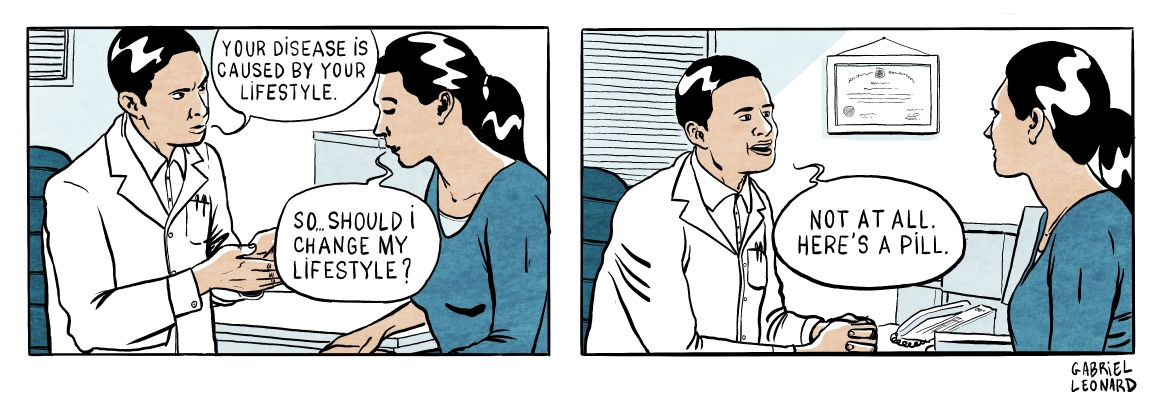How (and When) to Check In on Your Health
Even if you’re in your 20s or 30s, regular health check-ins are a must.
If you’re reading this newsletter, you’re likely in your 20s, 30s, or 40s and live a relatively healthy lifestyle. You’re probably mindful of your diet, exercise at least on occasion, and do some form of therapy or stress relief. You might even be doing awesome when it comes to self-care.
But we’re never in total control of our health, and despite our best intentions and efforts, health issues can creep up unexpectedly.
We are all living in ways, large or small, that have negative impacts on our health. Our hectic modern lifestyles and urban environments aren’t designed for optimal well-being—and we all face some unavoidable level of stress and toxin exposure. This isn’t something to be anxious about, but it is a reality to be aware of so that you can take counteractive measures where necessary.
The reality is that you don’t know what you don’t know. This is why I am a firm believer in the power of regular health check-ins, especially with a functional MD. In my opinion, this is a non-negotiable for leaders and high-performers, and really for anyone who wants to enjoy a long, happy life.
I’m not talking about an annual check-up with your doctor and recommended screenings for things like breast cancer and colon cancer, although you should absolutely be doing these things, too.
What I’m referring to here is a comprehensive functional health check-in. This involves finding a health wizard (aka a skilled functional medicine doctor) to support you in undergoing comprehensive testing and analyzing the results so that you can make lifestyle shifts to support your well-being in the long run. I’ll offer my suggestions for how to do this, whether you’re on a tight budget or have resources to invest.
These check-ins are a critical investment in your well-being, offering the opportunity to catch and address potential health issues early. You might not think you need it—but you also might be very surprised by what shows up.
That was the case for me when a recent check-in revealed that I was pre-diabetic and at high risk for heart disease.
A Humbling Health Check-Up
Life has a way of reminding us to pay attention to things we’ve taken for granted, like our health.
I recently learned that despite living a very healthy lifestyle—mostly organic food, no sugar, no alcohol, daily exercise, 7-8 hours of sleep, not a ton of stress, and doing work that I love—I was still on a fast track to diabetes and heart disease, which run in my family.
It wasn’t the first time I’ve faced a real health scare.
Seven years ago, I was diagnosed with a rare autoimmune neurological illness that took a full year to recover from. During that time, my entire world revolved around my health. I became acutely aware of the importance of my well-being when I suddenly didn’t have it anymore.
Over the course of that year, I slowly returned to health with the support of an incredible functional medicine doctor. If you’re not familiar with functional medicine, it’s an emerging field that focuses on finding the root causes of disease and imbalance rather than treating the symptoms. While a regular MD can help treat your symptoms once you’re already sick, a functional medicine doctor is an MD who is trained to help you figure out what’s going on before it manifests in illness. They can also support you in making lifestyle adjustments to promote health and balance.
During this time, I went deep into the world of health and wellness, listening to podcasts and reading health books. I totally was ‘healthed out’ by the end of that year. I was done thinking about supplements and therapies and diet plans—I just wanted to get on with it and enjoy my life again.
After OD’ing on health information, I decided to step back for a while. I figured I’d incorporate the best practices I learned to live a healthy lifestyle, but not attempt to keep up with the world of health media and information. When it felt right, I would dip back in and update myself on all the best practices and new developments that had emerged.
Last year, at the age of 35, I decided that it was time. I was ready to dive back in and invest some time and energy in improving my health. I’ve always considered myself a healthy person. I’m an athlete and I prioritize my well-being. I felt pretty good overall, so I was just looking to make some minor adjustments to give me an extra boost of energy and vitality.
I went for a full check-in with my new functional medicine doctor and quickly realized how much I was still getting wrong. It was humbling—confronting, even. I didn’t get the clean bill of health that I was expecting. I didn’t just need to up my zinc levels or tweak my thyroid hormones. What did we find? I was actually pre-diabetic and at high risk for heart disease.
Diabetes: A Surprising Revelation
One of the first things my doctor recommended was a comprehensive blood test and the use of a Continuous Glucose Monitor to measure my glucose levels throughout the day. Don’t know what a CGM is? It’s that little patch you’ve probably seen people wearing on their triceps. These handy devices give you real-time data on your blood sugar levels, providing a wealth of information about how your body is reacting to what you eat. As an athlete who prided myself on making health-conscious choices, I was stunned when my CGM results indicated that I was pre-diabetic. I couldn’t wrap my head around it: How could someone like me, who rarely consumed sugar and focused on organic, healthy foods, be on my way to diabetes?
It turned out that I had been simply eating too much, and, I’ll admit, I was overindulging on sweet potato chips (it was an addiction at times). I was also eating a ton of fruit, which was contributing to my elevated glucose levels. I panicked pretty hard and then decided to do what I could to clean up my diet. I committed to following the simple plan my doctor advised: intermittent fasting, reduced carbohydrate intake, fewer chips, less fruit, and meals packed with protein and non-starchy vegetables. To my amazement, these adjustments swiftly reversed my pre-diabetic status. Overnight, I was no longer on a path to acquiring diabetes. It was a lesson in the power of regular check-ups and the importance of making necessary adjustments before problems worsen.
All it took was a few small tweaks to my diet to get off the fast track to diabetes and shift back to a healthy, optimal state.
Heart Disease: A Wake-Up Call
My blood tests also uncovered another uncomfortable truth: I was at high risk for cardiovascular disease. Several key blood markers were well above the recommended range, which posed long-term risks to my heart health. With the guidance of my doctor—and after reading longevity physician Peter Attia's insightful book Outlive: The Art and Science of Longevity—I started taking a statin plus supplements like CoQ10, curcumin, and fish oil to support my cardiovascular function.
While I’d been against the idea of taking medication regularly, the more I learned about statins, the more I bought in. Without any side effects, my cholesterol markers dropped to a much better place. Subsequent tests showed that my heart health markers are now much better than before.
These simple interventions might add years to my life. Both diabetes and heart disease are slow, insidious threats that often creep up over time. Thank God I discovered this at 35 and not at 45 or 50.
Mold: An Unexpected Discovery
Around the time of this check-up, my wife and I found mold in our bedroom that had developed from a leak six months earlier. I decided to take a urine test to check for mold, and sure enough, I had an unhealthy level of mold in my system. Not a ton, but enough that it was important for me to begin a process of detoxing it out of my system. I wasn’t experiencing any symptoms that I was aware of prior to the test, but left unchecked, mold toxicity can create inflammation and lead to things like allergies, brain fog, skin irritation, and asthma.
A caveat on this one, these mold tests (while valuable) are a bit controversial because false positives and negatives are common. And I will say that the journey of detoxing even a small amount of mold has not been pleasant, I’ve been sad a lot. So I’m not sure I can fully recommend this one. Mold tests and detoxing mold are a whole can of worms that I’m not trying to get into, so tread carefully here.
Regular Health Check-Ins: Just Do It
As you might imagine, getting a thorough health check-up from a Functional MD isn't always a pleasant experience. It can be costly and may reveal uncomfortable truths. If you’re like me, you may get scared and not want to face the facts. Or you might have resistance to making the necessary changes to your diet or lifestyle. But if you want to live a long and healthy life—and I assume you do—regular assessments with a trusted healthcare provider are a must.
That being said, I understand that investing in expensive testing (which is rarely covered by insurance) isn’t an option for everyone. I recommend exploring the valuable, low-cost resources provided by experts like Peter Attia (his book Outlive is a great place to start) and functional medicine doctor Mark Hyman, whose books and podcast, “The Doctor’s Farmacy,” offer a wealth of knowledge and tools that can empower you to take charge of your well-being. I also like the people at Function Health, a new healthcare start-up that offers comprehensive bloodwork and functional medicine testing (including key markers for heart health, autoimmunity, thyroid function, hormone levels, and allergies) for a fairly low price. It’s a worthwhile option to consider if you’re on a budget. If you want to go deeper, find a functional medicine doctor in your area who comes highly recommended (The Institute for Functional Medicine has a large referral network). If you live in New York City, Parsley Health is a great option, too. If you live in Boulder, I know few of you do, I really like my doctor Dr. Tusek at Cloud Medical.
The bottom line is that your health is the foundation on which all other pursuits rest. If you’re a leader or a person making things happen in the world—which I assume you are— you’ve gotta prioritize your physical and mental well-being. If you want to lead at the highest level, it’s essential to resource yourself properly. You need to be healthy and energized enough to go the distance, both for yourself and those you lead.
To be clear, this isn’t about going strictly vegan, paleo, or keto, or working out at 5 a.m. every day, or becoming obsessive about your health in any way. I know it’s easy for many of us to go to extremes, but it’s not necessary (or advisable). This is about self-awareness, small but consistent lifestyle adjustments, and incremental progress that can add up to make a huge difference over time. This is about having the energy to realize your greatest potential.
The journey towards well-being is a lifelong process, so let’s be patient with ourselves. By actively participating in our health from a place of commitment and self-love, we can lead richer, more fulfilling lives. Let's make it a priority to ensure that we have the strength and vitality to enjoy all the joy and magic life has to offer.





